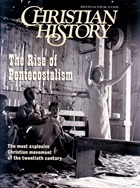Preach in Jesus' Name,
teach in Jesus' Name
Heal the sick in his Name;
And always proclaim,
it was Jesus' Name
In which the power came;
Baptize in His name,
enduring the shame,
For there is victory in Jesus' Name.
So went one of the hymns of the Oneness Pentecostals, for whom Jesus was the name of the Father, the Son, and the Holy Spirit. Their desire to recapture the mantle of the apostolic church started with questions over the proper formula to use in water baptism. But they were soon questioning even the doctrine of the Trinity.
In April 1913, a Pentecostal-Holiness meeting was held in Arroyo Seco, California. Between 1,500 and 2,000 Pentecostals, mainly pastors, attended the meetings each night, with hundreds more filling the camp on Sundays. It was here that Robert Edward McAlister, a respected Canadian minister, observed that though Jesus had told his disciples to "baptize [disciples] in the name of the Father and of the Son and of the Holy Spirit," the New Testament invariably records the apostles baptizing only "in the name of Jesus."
Pentecostal preacher Frank J. Ewart later said, "The gun was fired from that platform which was destined to resound throughout all Christendom."
In fact, by January 1915, the message had spread across the continent. Many of the Pentecostal faithful were rebaptized to follow the ways of the apostolic church. They believed older doctrines, long diseased by generations of unfaithfulness and the inability to heed God's Spirit, were being uncovered by this "new light" of the Holy Spirit.
For most of the new adherents, this was just a different formula for baptism, not a conscious rejection of the Trinity. Eventually, however, while Oneness Pentecostals worshiped God as Father, Son, and Holy Spirit, the terms Trinity and persons were rejected as unbiblical.
Two in the Spirit
J. Roswell Flower, later secretary of the Assemblies of God (AG), was anxious not only about the apparent denial of orthodox doctrine but also with the potential this "new issue" had for creating division. He urged other leaders to call a meeting of the General Council to prevent it from spreading.
On October 1, 1915, 525 delegates met in St. Louis, ready for a confrontation. The Oneness adherents did not present an aggressive front, so no strong effort was made to censure them. Instead the council proposed a compromise. It specifically denounced the practice of rebaptism as well as a few other Oneness doctrines. But it acknowledged both formulas for baptism as Christian.
The Oneness Pentecostals became increasingly vocal after the council, and within a year, the AG delegates were back in St. Louis. They were to decide once and for all whether the denomination was big enough to accept Oneness adherents.
Since its formation in 1914, the group had rebelled against formal organization. They wanted to reestablish the church of the New Testament, and the New Testament gave no examples of organization beyond local churches. Creeds, "tradition," and power structures had corrupted the church and stifled the Holy Spirit.
So rather than address the doctrinal issues of the Trinity, the Oneness contingent (made up largely of African-Americans) stressed that they did not want to establish a set of doctrinal statements for the AG. In fact, they voted against every proposition that was raised.
Their strategy failed. A "Statement of Fundamental Truths," almost half of which was a repudiation of Oneness beliefs, was accepted as the AG standard. More than a quarter of those attending, 156 members, were forced to leave the AG and form new organizations (the most important of these were the Pentecostal Assemblies of the World and—via several future mergers—the United Pentecostal Church.) But because of the AG's reaction to the "new issue," the group became solidified as a denomination early in its history.
Many small Oneness groups formed after 1916, though many have remained independent. Today scholars estimate there are between 1.5 and 5 million Oneness Pentecostals worldwide, and they make up only a fraction of one percent of the world's Pentecostals.
Kenneth Gill is acting director of the Billy Graham Center Library in Wheaton, Illinois.
Copyright © 1998 by the author or Christianity Today/Christian History magazine.
Click here for reprint information on Christian History.

Support Our Work
Subscribe to CT for less than $4.25/month





























